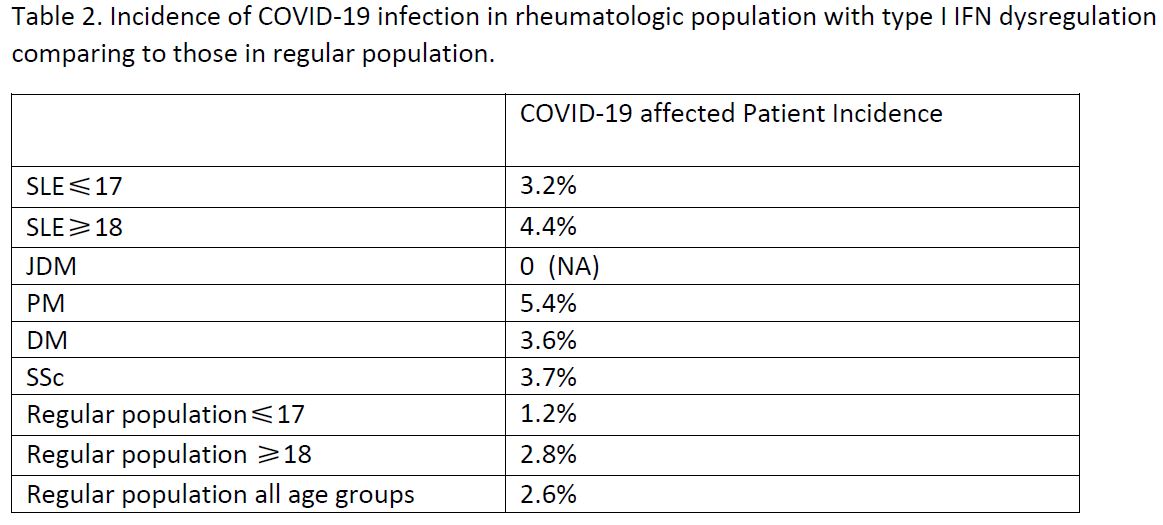Session Information
Date: Tuesday, November 9, 2021
Title: Pediatric Rheumatology – Clinical Poster III: Miscellaneous Rheumatic Disease (1614–1644)
Session Type: Poster Session D
Session Time: 8:30AM-10:30AM
Background/Purpose: COVID-19, as a member of the Coronavirus family, has been described to trigger host immune response via type I interferon (IFN) signaling pathways with variable degrees. Some patients have mild IFN activation, while some develop hyperinflammation. In pediatric patient population COVID-19 has been a mild infection partially explained by the robust acute innate system activation early in the clinical phase of the infection. Etiopathogenesis of rheumatologic diseases like systemic lupus erythematosus (SLE) also involves IFN dysregulation and hyperinflammation as well, so do juvenile and adult dermatomyositis (JDM, DM), polymyositis (PM), systemic sclerosis (SSc) and scleroderma (SD). We hypothesized that COVID-19 infection may increase the incidence of autoimmune rheumatologic diseases that are known to have etiopathogenetic link with type I IFN-dysregulation.
Methods: Data were obtained from the COVID-19 Research Network of TriNetX, a real-world database collected from electronic health records in 61 health-care organizations globally. We created queries of patients who had been diagnosed with rheumatologic diseases (SLE, JDM, DM, PM, and SSc) one year before the pandemic (defined as March 1st, 2019 to February 29th, 2020) and during the pandemic (defined as March 1st, 2020 to February 28th, 2021). For patients diagnosed with SLE, two separate queries were created to divide patients into pediatric and adult population. We compared the incidence of these rheumatologic diseases during and before COVID-19 pandemic and their incidence in COVID-19 affected and unaffected population. We compared COVID-19 incidence in these rheumatologic diseases to those in regular population. We used chi square statistics for establishing significance.
Results: Incidence of pediatric SLE and JDM increased by 22% and 44% respectively during the pandemic as compared to before the pandemic. Incidence of adult SLE, PM, DM, SSc decreased by 8%, 20%, 10% and 15% accordingly (Table 1).
COVID-19 incidence in pediatric SLE patients (3.2%) is greater than COVID-19 incidence in regular pediatric population (1.2%). COVID-19 incidence in adult SLE (4.4%), PM (5.4%), DM (3.6%) and SSc (3.7%) patients is greater than COVID-19 incidence in general adult population (2.8%) (Table 2).
Incidence of pediatric and adult SLE in COVID-19 affected population were significantly higher when compared to COVID-19 unaffected population (pediatric SLE 0.027% vs 0.009%, p=0.00033; adult SLE 0.13% vs 0.077%, p < 0.00001) (Table 3).
Conclusion: Those pediatric rheumatologic diseases known to have dysregulation in type I interferon signaling showed increased incidence rate during COVID-19 pandemic. Our results indicate that COVID-19 infection may induce type I interferon activation in children and may result in particular autoimmune disease activity regulated with abnormal interferon pathway signaling. Further studies of pediatric patients affected by COVID-19 infection who proceed to develop new onset autoimmune disease activity are required to help understanding the disease pathogenesis of type I interferon induced pediatric rheumatologic diseases.
To cite this abstract in AMA style:
Dou X, Kaelber D, Bukulmez H. Increased Incidence of Pediatric SLE and Other Interferon Activated Diseases During COVID-19 Pandemic [abstract]. Arthritis Rheumatol. 2021; 73 (suppl 9). https://acrabstracts.org/abstract/increased-incidence-of-pediatric-sle-and-other-interferon-activated-diseases-during-covid-19-pandemic/. Accessed .« Back to ACR Convergence 2021
ACR Meeting Abstracts - https://acrabstracts.org/abstract/increased-incidence-of-pediatric-sle-and-other-interferon-activated-diseases-during-covid-19-pandemic/



